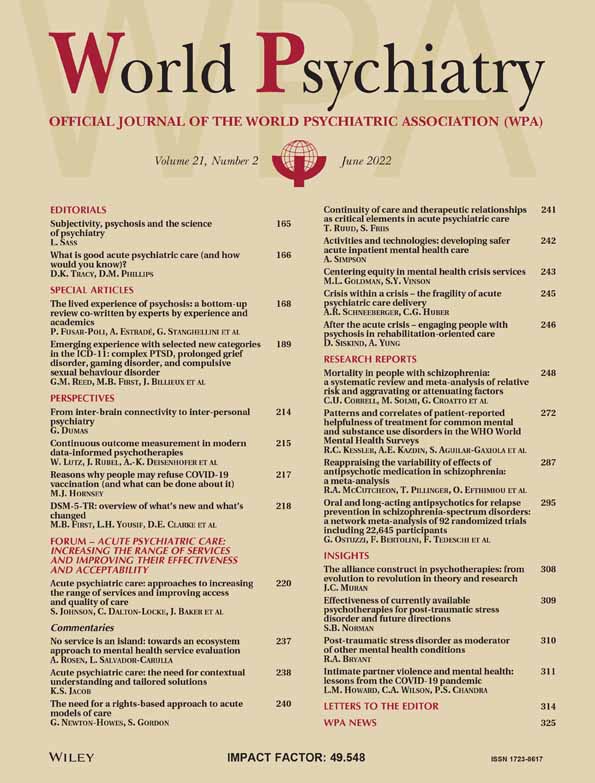The WPA Working Group on Intellectual Developmental Disorders: the need for a second paradigm shift
The WPA Action Plan 2020-20231-3 coincides with a much-needed focus on the mental health needs of people with intellectual disabilities/intellectual developmental disorders (IDD). A Working Group on IDD has been formed and has met for the first time at a Presidential Symposium during the 19th World Congress of Psychiatry in Lisbon, Portugal in August 20194.
A recent international review of service models for IDD5 has highlighted that some countries rely on high-quality specialist services that are however difficult to reach, while only few countries use trained volunteers to work with family networks to provide care and support, education, training and employment to affected people. It is evident that very few low- and middle-income countries (LMICs) have any significant services for persons with IDD across the lifespan. Furthermore, any mental health care provided entails untrained staff practicing in segregated facilities. Factors that impact the quality of services in LMICs include cultural barriers, social stigma, geography, transport links, poorly developed legislative frameworks, and poor government spending.
The activities of the WPA Working Group on IDD have been envisioned under the World Health Organization (WHO) framework recommended by the ICD-11 relevant Work Group6. That framework has been widely acknowledged as the impetus for the paradigm shift in the classification of IDD as a neurodevelopmental condition in both the DSM-5 and ICD-11. This approach recognizes that functional limitations often coexist alongside strengths, and that both are to be considered during the individuals’ assessment; and that descriptions of limitations should be aimed to develop a profile of needed supports. It also underscores the need to identify the underlying etiologies, consistent with the WPA public health mission to emphasize the importance of risk factors and to adopt evidence-based preventive and rehabilitative interventions.
The WPA Working Group on IDD has participated this year in the initiative called Rehabilitation 2030, sponsored by the WHO Department of Noncommunicable Diseases, Disability, Violence, and Injury Prevention, aiming to develop a package of rehabilitative interventions7 along with specified resource requirements for their delivery. The overarching goal is the improved care of persons with IDD across the lifespan, with a particular emphasis on LMICs.
Following on these ground-breaking approaches in classification and evidence-based interventions, the Working Group is now promoting a second paradigm shift aiming to include training on IDD within mainstream psychiatry, once again with a particular emphasis on LMICs.
Three important arguments justify this call. First, when polled about their knowledge on the impact of IDD, many trainees in psychiatry recognize the disproportionately high burden of co-occurring mental disorders in persons with IDD8. Second, when offered opportunities to interact with persons with IDD during rotations, many trainees in psychiatry regard such experiences as highly formative and inspiring. Third, and most important, psychiatry as a profession has the potential to improve significantly the care for persons with IDD.
Furthermore, the gap in mental health services for persons with IDD is too significant to be compensated by an ad hoc reliance on individual providers and families, and their resilience is not limitless. Moreover, within the context of the COVID-19 pandemic, persons with IDD are facing the utmost intensification of inequities in term of underlying medical liabilities, inability to socially distance, increased infection and mortality risks, challenges to participate in telehealth services, and ensuing social isolation and adverse mental health outcomes9.
The Working Group and the WPA leadership invite Member Societies to work collectively to enhance efforts for the development of inclusive training models in the mental care of persons with IDD. The Working Group is ready to provide awareness raising, training, and research collaboration to promote and disseminate effective services and thereby improve the lives and outcomes for persons with IDD. For this purpose, the Working Group is developing an open access handbook focusing on global aspects of the psychiatry of IDD, with authorship from both LMICs and high-income countries. In parallel, the Working Group is developing online educational materials summarizing the key aspects of psychiatric care in people with IDD. These resources will be accessible through the WPA educational portal in 2022.
The WPA Working Group on IDD encourages systematic exposure to and experience in this area for all psychiatrists, so that they can adjust treatments for co-occurring mental disorders and avoid diagnostic overshadowing in which IDD may be wrongly considered the cause of all behavioural problems, and psychiatric, physical as well as environmental factors may be overlooked. Since relatives remain key partners as well as co-providers of services for people with IDD throughout their lives, the Working Group encourages provision of support to families by using local networks, with access to specialists for training and supervision as well as to more intensive forms of treatment for co-occurring problems (e.g., autism spectrum and seizure disorders)7. Third, the Working Group calls for the development of targeted mental health services including psychiatrists and allied professionals, who will need additional training to improve their diagnostic and therapeutic skills relevant to IDD. Finally, the Working Group emphasizes the need for person-centered care tailored on abilities and aspirations of affected persons, blending the social and medical models of development and disability within a human rights framework to improve access to health care, education and employment.
These themes have been the subject of presentations in Presidential and State-of-the-Art Symposia at the World Congress in Lisbon, and subsequently at the World Congresses in Bangkok, Thailand in March 2021, and Cartagena, Colombia in October 2021, and will continue to be addressed by the Working Group at forthcoming WPA congresses and conferences.




